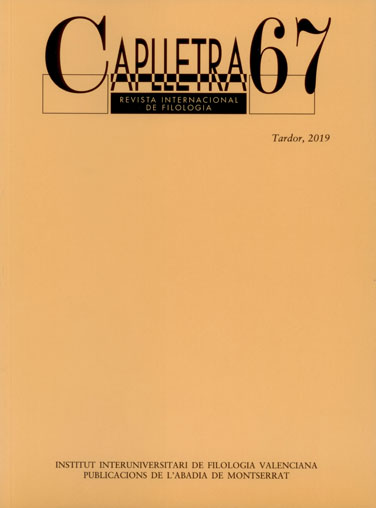The causative verbal meaning of the Catalan verb «interessar» («to interest») with prepositional complement
DOI:
https://doi.org/10.7203/caplletra.67.15371Keywords:
verb alternation, interessar, causative sentence, three-argument sentence, psychological verb Abstract
Abstract
The verb interessar (to interest) has a rich syntactic flexibility that allows it to take part in a wide range of verb alternations. It has a causative verbal meaning that is unusual within the paradigm of the Catalan psychological verbs, because it can take part in three-argument causative constructions of change of state which do not have Pesetsky’s Target/Subject Matter (T/SM) Restriction (1995) (La Meritxell va interessar la Núria pel teatre [lit.: Meritxell interested Núria in the theatre]), it resists the use of the verb without the experiencer (??La Meritxell va interessar pel teatre [lit.: ??Meritxell interested in the theatre]) and demands the presence of a prepositional phrase (*La Meritxell va interessar la Núria: [lit.: *Meritxell interested Núria]). In addition, alternation with a pronominal verbal meaning differs from the causative alternation of other causative psychological verbs with an experiencer object. The lexical specificity and syntactic flexibility of the verb interessar are a challenge in the debate on how to approach the lexicon-syntax interface.
 Downloads
Downloads
Downloads
Published
How to Cite
-
Abstract539
-
PDF (Català)439
Issue
Section
License
Authors submitting work to Caplletra for publication must be the legitimate holder of the usage rights. Legitimacy for the purposes of publishing the work must also include images, tables, diagrams and any other materials that may complement the text, whether they are the author of such material or not.
Copyright: on publishing their work in the journal, the author grants Caplletra. Revista Internacional de Filologia usage rights (reproduction, distribution and public communication) for both the paper printed version and for the electronic version.
All work published in Caplletra is covered by the Creative Commons license type Attribution-NonCommercial-NoDerivatives 4.0 (CC BY-NC-ND 4.0).
RESPONSABILITY
Caplletra. Revista Internacional de Filologia does not necessarily identify with the points of view expressed in the papers it publishes.
Caplletra. Revista Internacional de Filologia accepts no responsibility whatsoever for any eventual infringement of intellectual property rights on the part of authors.






